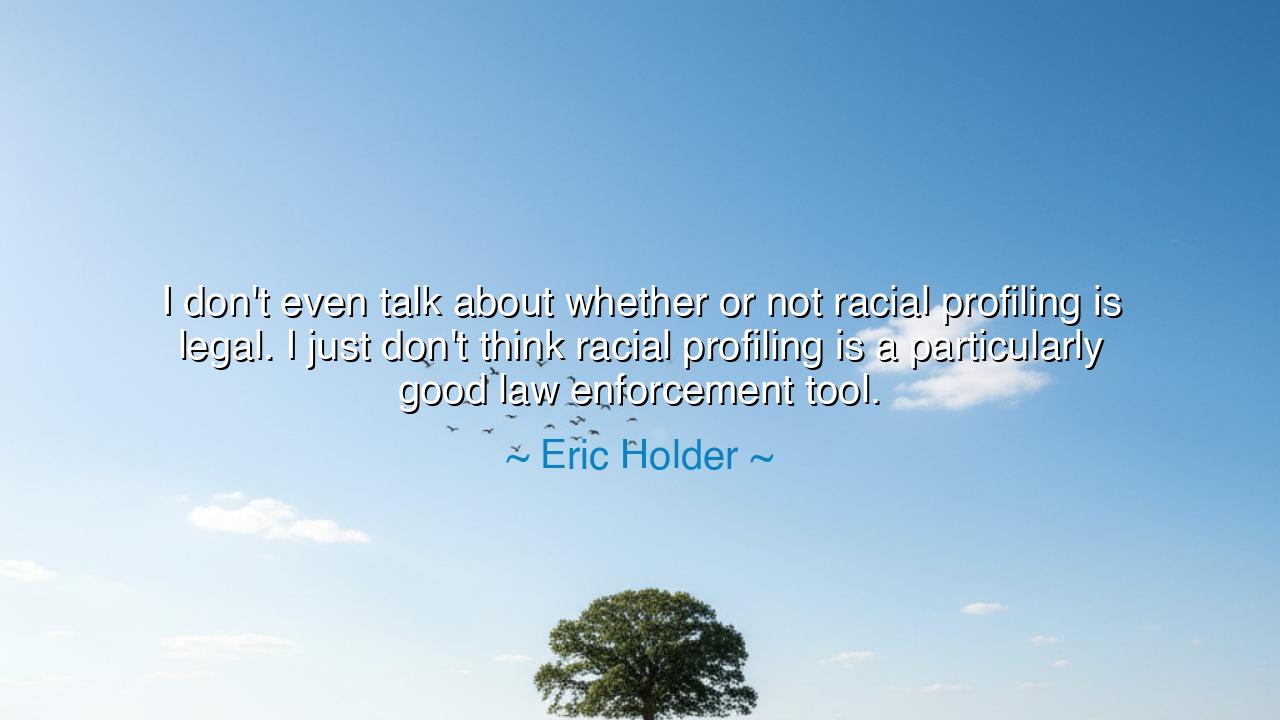
I don't even talk about whether or not racial profiling is legal.
I don't even talk about whether or not racial profiling is legal. I just don't think racial profiling is a particularly good law enforcement tool.






There are words that pierce the fog of policy and touch the conscience of a nation. When Eric Holder, a former Attorney General of the United States, declared, “I don't even talk about whether or not racial profiling is legal. I just don't think racial profiling is a particularly good law enforcement tool,” he spoke with the weight of experience and the clarity of moral vision. His statement rises beyond the language of legality into the realm of justice, reminding us that not all that is legal is right, and not all that is right is yet lawful. For true order is not maintained by suspicion, but by fairness; not by fear, but by trust.
The origin of this quote lies in Holder’s long struggle against the inequities that have haunted the American justice system. As the first African American to hold the office of Attorney General, he carried within him both the authority of law and the memory of its misuse. His words were spoken not as theory, but as testimony—from one who had seen how racial profiling corrodes the moral core of law enforcement, turning protectors into predators, and communities into places of quiet resentment. By refusing to dwell merely on whether such acts were “legal,” he drew a sacred boundary: that the measure of justice must not stop at the letter of the law, but reach the heart of humanity.
Throughout history, societies have faced this same struggle—the temptation to justify injustice by cloaking it in legality. In the Roman Empire, it was “lawful” for the conqueror to enslave the conquered. In the early modern world, it was “lawful” to trade human lives across oceans. Yet, as the philosopher Cicero once wrote, “The welfare of the people is the supreme law.” Holder’s statement carries that same spirit: that a law, or a practice, ceases to serve justice when it divides the people it was meant to protect. Racial profiling, by its nature, replaces discernment with prejudice, reason with assumption, and in doing so, betrays the very essence of law itself.
Consider the story of Thurgood Marshall, another man who stood at the crossroads of legality and morality. As a young lawyer, he fought against laws that upheld segregation—laws deemed “constitutional” at the time. He knew that to obey such laws was to betray justice. And so, he argued not merely in the courts, but in the conscience of the nation, until the doctrine of “separate but equal” was overturned. Eric Holder’s words walk the same path, reminding us that a society is not measured by the efficiency of its control, but by the equity of its compassion. The law must serve all citizens, not by dividing them into suspicion and privilege, but by seeing them as equal bearers of dignity.
Holder’s rejection of racial profiling as a “tool” carries a deeper wisdom about the nature of power itself. Tools are meant to build, not to harm; to create, not to destroy. When the instruments of justice are used without wisdom, they become weapons that erode the very foundation they were meant to strengthen. The ancient Chinese philosopher Confucius once warned, “If names are not correct, language is not in accord with the truth of things.” So too, when justice is misnamed as law, or discrimination disguised as security, the truth of justice is lost. A nation that polices by prejudice cannot govern by peace.
His statement also reminds us that the highest form of justice is wisdom, not vengeance. The effectiveness of law enforcement does not come from domination, but from trust. A community that fears its protectors becomes a field of silence and bitterness. But a community that is respected, and treated with fairness, becomes a fortress of cooperation. Holder’s words, therefore, are not only a critique of racial profiling—they are a vision for how a society sustains its moral strength. They tell us that safety built upon injustice is fragile, but safety built upon trust is eternal.
The lesson for future generations is clear: legality is not the same as righteousness. The truly just must look beyond the question of “Can we?” and ask instead, “Should we?” We must hold our laws to the higher standard of humanity, for only then do they serve their true purpose—to uplift, to protect, and to unite. Let every citizen remember that justice must be pursued not only in courts, but in hearts; not only through laws, but through conscience. For the law, without virtue, becomes a mirror of our fear; but the law, guided by fairness, becomes the light of our civilization.
Thus, the words of Eric Holder live on as a warning and a guide. Do not mistake legality for morality, nor authority for justice. Let your actions, whether as citizen or ruler, be measured by the dignity they grant to others. In this lies the wisdom of all enduring societies: that true strength is not found in the might of the law, but in the justice that the law inspires. And when law serves compassion, when it sees beyond color into character, then—and only then—can peace dwell securely among men.






AAdministratorAdministrator
Welcome, honored guests. Please leave a comment, we will respond soon